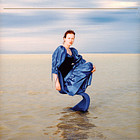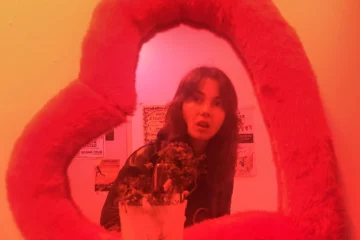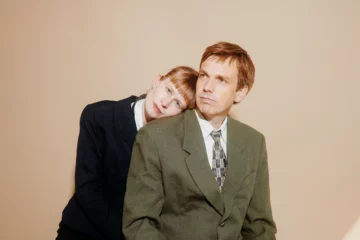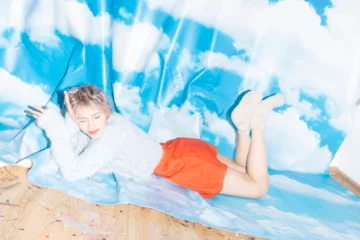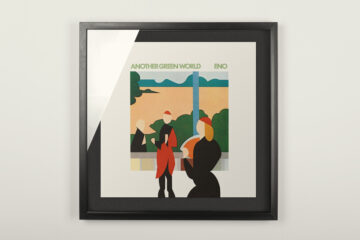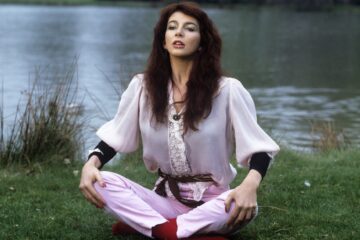It is a stormy January day in Berlin, too mild for the season, broken branches and a hodgepodge of Berlin dirt pirouette on the pavements. People are even more hectic than usual in this city. Rosa Anschütz doesn’t seem to notice any of this hustle and bustle as she sits in a café in Berlin’s Wedding district this afternoon. Although she would have every reason to: After »Votive« and »Goldener Strom«, her third album is about to be released. It is called »Interior« and, as the title suggests, it offers a glimpse into the artist’s inner life.
On this album, Rosa Anschütz breaks out of the stylistic dead-end she was pigeonholed into with the thumping Kobosil remix. No longer on BPitch, »Interior« was released on the smaller Klangbad label, which gave her the space to really spread her wings, as she puts it. Compared to the almost pop vibes of her previous release »Goldener Strom«, »Interior« feels mature and fragile, revealing vulnerability—and that’s exactly what makes it stronger and bolder than anything she’s released before.
We caught up with the artist to talk about her new music, the power of her voice, world-weariness and her transmedial approach to work.
Originally your album was supposed to be released in November last year, but then the release was pushed back to the end of February. Aren’t you sitting on hot coals?
Rosa Anschütz: Yes, absolutely. We had already finished the EP in 2022, and the rest of the tracks have been finished since last April. And the music suits the winter well too. But March can still drag on. (laughs) The album itself has been a wonderful experience so far, because it wasn’t with a label that pressured me, but with one that gave me control. And we produced some great material. The artwork is also much finer than before. We also made two films for it, with two great film makers. One in the studio, behind the scenes. And the other in the Zeiss Planetarium in Berlin, a bit of fiction. I also played a gig there at the end of November. We had to move the release date from November to February because the promo agency needed more time. I would have been ready to release the album much earlier.
It’s about this uncertainty of where you belong and what you need to live.
Rosa Anschütz
When was »Interior« made?
Mainly in 2022. In 2021 I finished my degree in transmedia art and then I was faced with the question: Okay, what am I going to do now? And then I came across these sequin pictures that are reflected in the artwork for the album. Working on these pictures is calming. It takes about two weeks to make one picture. Actually, it all started with those pictures and the pieces that are now on the album came after that.
And can you tell us more about the new songs? What makes them special?
It’s always been my wish to have a lot of space for the vocals and not to limit them. And that’s what we did on »Interior« and we said: The vocals come first and then the instruments. The album describes parts of my inner self, how I feel about things. The lyrics are partly like manifestos and something I’m very clear about. On the other hand, I also question a lot of things. It’s about this uncertainty of where you belong and what you need to live. And I play with different vocal pitches to approach these perspectives.
The question of what you need to live is also something you ask very concretely in the song »How much do you want of life«.
That’s really the question that the album is about, and it’s also a very outward-looking question. In the lyrics, the question is directed at a person, but it’s also about things that affect me in general and that were on my mind when I was making the album. When you go through difficult times in life and you’re in an environment where addiction exists, how do you deal with it? And how do you live your life? That theme is a big part of my whole story. The body theme plays a significant part as well, because I’ve had a lot of problems with that for a long time. But also the question: What do you need to live? I don’t think I answer that question with this album. But there are so many things on »Interior«, from addiction to love to death. I don’t think I’ve ever dared to go there as much as I do on »Interior«. Maybe it’s because of my age, I’m turning 27 now. Getting old. (laughs)
Do you share a lot about yourself on the album?
I don’t think I write the songs in a way that you can hear that they’re about me. They can be about me, but a song should be accessible to other people. I talk about certain things, but it’s more a feeling that I want to convey.
I hear a general sense of world-weariness in your songs, but also very specific themes like heartbreak.
Yes, absolutely. There are also very explicit things that have happened that I’m working through. I actually had a heartbreak, but there have also been powerful experiences like illness. Experiences that take up so much space that it’s hard to stay in yourself. I tend to look at things with a bit of distance and then try to understand. That can be something like world-weariness, but it’s never just one aspect.
Looking at your development, how would you place your new album »Interior« next to »Votive« and »Goldener Strom«?
It’s definitely closer to Votive. And »Votive« was also a reaction to my first EP with Rigid Remix by Kobosil: It was explicitly quieter, I was able to return to myself with it. Sometimes I wonder what influence it would have had on my work if the Rigid remix hadn’t been so successful. It was on my very first EP. If it hadn’t been for that remix, a lot of things would have been different. And sometimes I don’t know if I would have been freer or if I wouldn’t have got opportunities. I probably wouldn’t have got together with BPitch as a label. But now I also feel an ambivalence towards »Goldener Strom«. I like the album, but I also found it difficult and somehow rigid. I don’t want to move in genres or fulfil stereotypes. Many musical styles have such a fixed aesthetic. And the last time I was stuck in such a fixed aesthetic was when I was a teenager and I was into post-punk and industrial. But I find it boring when things repeat themselves, when everything looks the same and has to sound the same. So musically, Interior is something I’ve wanted to express for a long time. Standing up for my vision has meant facing a lot of resistance and now having the courage to break free and just go.
I was sitting there with my sequins, working on it through the entire journey, listening to a lot of Olive and St Etienne.
Rosa Anschütz
Every song on »Interior« sounds different.
It was created in different moments and situations and that is also reflected in the music, through a different expression or a different performance. And this brings us back to aesthetics. Sometimes I wonder how it will be received, that something beautiful and tender can exist next to something very hard, the body language I use compared to what people want to see from me now.
How did you come up with your new label Klangbad?
Klangbad as a label and the Faust Studio, where I recorded my album, are very closely connected. And the connection came about through Jan Wagner, who I co-produced the album with. He has known the studio for a long time and learned everything from Hans-Joachim Irmler, who runs it. It is located in the middle of the countryside in Baden-Württemberg. Jan now lives there again with his family.
You’ve been working with Jan Wagner since your first album.
Yeah, we actually know each other through Max Kobosil. They studied together. Max Kobosil found my early stuff on Soundcloud and contacted me, and then later put me in touch with Jan.
You studied Transmedia Art in Vienna and are now back in Berlin. To what extent are your studies reflected in your work?
In that my work has no boundaries. When I have an idea, I give myself the freedom to turn it into reality. For example, for »Votive«, little votive figures were created for each track. For »Goldener Strom« we made very elaborate music videos. And now with this album it’s the sequin pictures. The album cover collages the landscapes from each picture. And the album after »Interior«, which I’m already working on, will be called »Sabbatical«, which I actually wanted to do a comic for again. Before my studies I was very sure that I wanted to become a comic artist.
Related reviews
Apart from the new album, what else are you looking forward to in 2024?
There have been collaborations and mergers, including my band Spoil, tracks with Vanity Productions, Eros, Teplota and Julia Shortreed. I’m working on music for a feature film, theatre and another film. I think they should all come out in the course of 2024.
Sounds like you have a lot on this year.
Yes, but I also want to keep things flowing. Otherwise the thinking doesn’t go so well. I also like to travel, I like to take the bus. I did a lot of those sequin pictures for »Interior« on a Flixbus. I was sitting there with my sequins, working on it through the entire journey, listening to a lot of Olive and St Etienne.



